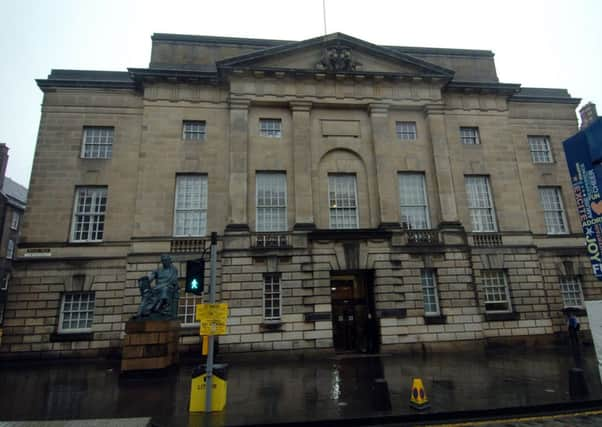Lawyers revolt forces legal aid cuts retreat


New legislation, aimed at cutting the legal aid bill, would see defendants paying lawyers directly, instead of legal firms collecting money from the state.
The move, which was due to come into effect later this year, has been widely opposed by lawyers who fear losing out financially if clients refuse to contribute before their case is due to be heard.
Advertisement
Hide AdAdvertisement
Hide AdGuidance from the Law Society of Scotland, published in The Scotsman last month, advised lawyers not to appear in court on behalf of clients unless they had paid in advance, raising the prospect of hundreds of defendants being left to represent themselves and potentially opening up the Scottish court system to countless miscarriage of justice claims.
Last night, the Scottish Government said a revised timetable for introducing client contributions would be announced shortly.
“Legislation to introduce contributions for criminal legal aid was passed by parliament last year as part of a programme of reforms in Scotland to reduce spending while continuing to protect the range of cases eligible for legal aid,” a spokesman said.
“Following the changes to criminal work guidance recently announced by the Law Society, we have delayed the implementation of contributions, to ensure that these changes are taken into account.”
A series of public roadshows designed to explain the changes has also been postponed by the Scottish Legal Aid Board (Slab), it was confirmed yesterday.
Under the new legislation, accused people with a weekly disposable income of £82 or more will make a contribution in “summary” cases in sheriff courts, where the bulk of Scotland’s criminal cases are heard.
There were 77,000 summary cases in Scotland last year, 7,000 of which went to trial.
The Law Society’s call to drop non-paying clients was backed by both the Edinburgh and Glasgow bar associations.
Advertisement
Hide AdAdvertisement
Hide AdOpposition politicians warned the move would see Scotland’s court system “fall into chaos”.
The Scottish Government has been locked in talks with the Law Society over the festive period in an effort to find a compromise which would ensure defendants continue to be represented. Lawyers believe the government and Slab know many people would not pay contributions and fear that the move would amount to a cut in their pay, which they are not prepared to accept.
Mark Harrower, president of the Edinburgh Bar Association, said he believed the Law Society’s strongly worded guidance had shaken the government’s resolve. “This [delay] is clearly directly as a result of the change to code proposed by the society, which has been welcomed by most of the profession. The only explanation can be that they didn’t expect the Law Society to take such a strong line in order to protect solicitors,” he said.
“Slab know that if we follow the guidance, this will cause serious problems in cases where the client has failed to pay the contribution, for whatever reason, and exposes the fact that they simply believed we would make a noise but do nothing in practical terms about it.
“Slab believed we would simply swallow the losses brought about by unpaid contributions.
“They are clearly trying to think of a way round this but I’m not sure what they can do.”
Graeme Pearson, Scottish Labour’s justice spokesman, said the government had been warned about the possible consequences, and criticised justice secretary Kenny MacAskill.
He said: “It’s a hell for leather, let’s get a headline approach to justice policy, and is not the way a government should perform.”
Advertisement
Hide AdAdvertisement
Hide AdWhile the government insisted it was confident of finding a solution, the Law Society said it had the backing of the profession and was planning further talks next week. Ken Dalling, a member of the joint working group on client contributions, said: “Significant support has already been expressed for the stance the society has taken but we will be able to assess the issue more fully when the group meets next week to look at the feedback we have had from the profession.”
When the proposals were debated at Holyrood, Mr MacAskill insisted the changes would not lead to accused appearing unrepresented in courts.
The changes are part of the Scottish Civil Justice and Criminal Legal Assistance Act and are intended to save £3.9 million from the legal aid budget, which reached a record £161.4m in 2010-11. About 150,000 cases a year in Scotland qualify.
Scottish Tory justice spokeswoman Margaret Mitchell said: “The Scottish Government is skating on thin ice here and are in danger of breaching human rights legislation.”
Lawyers warn cuts will mean murderers and paedophiles walking free
Murder trials will collapse and paedophiles will walk free in England and Wales as a result of legal aid cuts, the man leading yesterday’s unprecedented walk-out by barristers has warned.
Thousands of barristers chose not to attend proceedings at courts in cities including London, Manchester, Liverpool, Leeds, Birmingham, Newcastle, Winchester, Bristol and Cardiff. The protest affecting England and Wales is the first in the history of the criminal bar.
The government plans to cut fees as part of a bid to slash £220 million from the legal aid budget by 2018-19 – reducing them by as much as 30 per cent in the longest and most complex cases.
Advertisement
Hide AdAdvertisement
Hide AdCriminal Bar Association chair Nigel Lithman said the “strike” had the backing of almost every chambers and accused Justice Secretary Chris Grayling of “manipulating” official figures to falsely portray lawyers doing criminal aid work as high-earning “fat cats”.
Mr Lithman said: “You are going to see cases collapsing, as they have already started. There are cases of murders, murder trials, that have collapsed because of them being inadequately prosecuted – that leads to enormous concerns for the victim’s family.
The Ministry of Justice highlighted figures showing that 1,200 barristers judged to be working full-time on taxpayer-funded criminal work received £100,000 each in fee income last year.